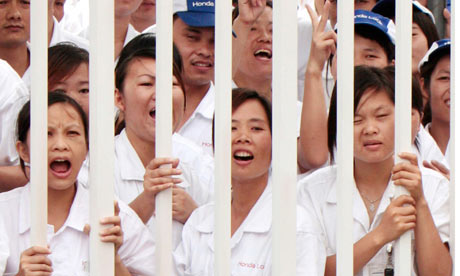Dal Guardian del 3.7.2010:
Workers in China grasp the power of the strike

Zhang Liwen found out that she was about to go on strike over a breakfast of steamed buns and congee rice porridge at her factory dormitory. Fifteen minutes later, she was taking part in industrial action for the first time in her life.
“I was worried, but everyone was excited and determined,” recalls the 21-year-old migrant worker at the Denso car parts plant in China‘s southern province of Guangdong. “We started our shift at the normal time, but instead of working we just walked around and around the workshop for eight hours. The managers asked us to return to our jobs, but nobody did.”
The next day she and the rest of the 1,000-strong workforce repeated the demonstration at the Japanese-owned factory, which makes parts for Toyota and Honda. This time, the corporate union begged them to go back to work. Again they refused.
There was no chanting, no speeches, no violence. When the workers got tired, they sat down and chatted for a few minutes. Then they got up and carried on walking until the end of the shift, marked their time cards and went home.
Industrial action does not get much lower key than this, nor does it get much more significant. The Denso strike was reported across the world because it took place on the frontline between global labour and global capital: workers in the workshop of the world had downed tools – and won.
For almost three decades, the world’s biggest corporations have outsourced an increasing share of their manufacturing operations to China, where they can benefit from cheap labour and lax regulation. In rich nations this has helped to keep consumer prices low and corporate profits high. In China it has meant workers having to endure a worsening environment, tough conditions and wage rises that have failed to keep pace with economic growth.
But Zhang (not her real name) was part of a recent wave of strikes to have hit foreign companies, prompting speculation of a readjustment. In the past two months workers have walked off production lines at three Honda plants, a Toyota supplier, a Hyundai factory in Beijing, a Taiwanese rubber products manufacturer in Shanghai and a Carlsberg brewery in Chongqing. The latest action, last week, was at a Japanese electronics firm, Tianjin Mitsumi, where workers crippled output with a sit-in, complaining they were being asked to work extra hours for no extra pay.
In almost every case the strikers have won at least a partial victory. Zhang and her colleagues at Denso went back to work last week after their Japanese bosses promised a rise in the monthly basic salary from 1,300 yuan (£125) to 1,700 yuan. In addition, they will get a bonus increase of 400 yuan per month.
Such successes have created a new cast of heroes for the global labour movement. Business analysts are warning that consumer prices might rise if the era of cheap Chinese goods is over.
The ruling Communist party – which has long since cast aside its revolutionary Marxist origins – faces a conundrum. Not wanting to stir up a Solidarity-like opposition, the prime minister, Wen Jiabao, has publicly called for improved working conditions. The People’s Daily, the mouthpiece of the Chinese Communist party, has hailed a “tipping point” of relations between labour and capital. There are hopes that a newly aspirational class of migrant workers might drive the economy away from cheap labour and production, so that China could finally leave behind its reliance on low-cost, high-polluting manufacturing.
Yet, off-stage, the authorities are terrified of instability and a fall in foreign investment. The governor of Guangdong has been called in to brief the politburo. Domestic reporters have been ordered to play down their coverage of the strikes to minimise the risk of copycat actions.
Perhaps for this reason, the workers who have won pay rises in Guangdong are far from triumphant about their success. There is none of the assertive militancy that was seen at the Yorkshire collieries in the 1970s or the Gdansk shipyards in the 1980s. Nervous of repercussions and suspicious of potential management spies, many workers play down their actions. “We don’t call it a strike. We just say we stopped work,” said Zhang.
“Nobody tells us who is leading the strike, because if everyone knew then the management might find out and punish them,” said another 22-year-old migrant worker. “Nobody told us there was going to be a strike until it happened.”
Off the record, workers said there had been a secret meeting the day before the strike started on 21 June. Rather than leave a digital record that could be traced back to their computers or mobile phones, the organisers handed out leaflets stating their demands to the management: an 800-yuan pay rise, the right to choose their own union representatives and a guarantee that nobody would be punished for striking.
On the day of the strike, the organisers were so cautious about revealing themselves that the frustrated management encouraged the official union to organise a vote for representatives so that they had someone to negotiate with. It was not so much a Solidarity moment as a stealth movement.
The Pearl River delta contains one of the world’s densest clusters of industrial estates. Many factories sit amid palm trees and vegetable fields ringed by broad roads and power lines. Workers’ dormitories sit close by, easily identified by the workers’ uniforms on the washing lines and the many pairs of trainers left to air by the windows.
The new communities are almost identical. The city of Foshan’s “Car Assembly Town” is typical: a few broad low-rise factories, a thicket of six-storey dormitories, an internet cafe, a mobile phone shop, a bank and a small street of food kiosks selling noodles, fried rice, boiled eggs and spicy stew. Off-duty workers with dyed hair, jeans and trainers wander out from their new dormitory, carrying umbrellas in a rainy season squall that sets the palm trees blowing wildly.
The turnover of worker
s is spectacularly rapid. Few of the dozen or so employees at Denso in Foshan and Honda Lock in Zhongshan are older than 22. Many are in their teens. Most are women. Waiting in ragged lines for the factory buses to come to pick them up from their dormitories, they look like pupils on their way to school or teens queuing up for a rock concert.
It hardly seems a hotbed of class war. “I felt guilty leaving the production line. This has really hurt the company, and what hurts them will hurt us,” was a typical response from one young worker. But they say rent, food and other living costs have risen faster than wages. After seeing Taiwan’s Foxconn electronics group raise salaries by more than 60%, they pushed for similar benefits. The way they went about it suggests changes may be afoot, albeit slowly.
Almost all of the employees at the affected firms in Guangdong attended vocational schools, meaning they had a relatively high level of education compared with the average in Guangdong. During the Honda Lock dispute, they hired a legal consultant, Chang Kai, a lecturer at Renmin University, to help them with negotiations.
Thanks to school networks, mobile phones and internet bulletin boards, they are far better organised than the previous generation of migrant workers. Their expectations are also very different. While their parents were willing to “eat bitterness” so they could send money to their desperately poor rural families, many of today’s young workers spend the bulk of their incomes on clothes and phones for themselves.
Demographics are on the side of labour. A bulge in the working-age population has started to thin, which is changing the balance between supply and demand. In recent years the flood of new migrants into Guangdong has slowed. According to labour rights campaigners, this is putting upward pressure on salaries.
“Labour shortages only existed because companies refused to offer decent wages. As soon as a halfway decent salary and reasonable benefits were offered, recruiters had no problem finding new hires,” wrote Geoff Crothall in a blog for China Labour Bulletin.
Many workers are asking for independent collective representation. Unions in China are usually funded by companies, staffed by management and answerable to the Communist party. During an earlier strike at the Honda plant in Zhongshan, union representatives fought workers, injuring two of them. “The union is basically useless,” said Zhou, one of the workers who had been on the strike. “It was wrong of them to beat us.”
Given this background, labour activists predict more unrest. “I think there will be more and more strikes. Workers have started to be concerned about their rights as well as their incomes. They have begun to realise that their economic poverty is due to their political poverty,” said Liu Kaiming at the Institute of Contemporary Observation.
Employers still have the upper hand in many firms. Many locals believe Japanese companies have been targeted because they treat their workers better than most factories in Guangdong. Local academics and journalists say the pay and conditions at Honda and Toyota are better than average in the province.
“I don’t know why the Honda workers went on strike, because their salaries and conditions are better than ours,” said Chen Jian, a 24-year-old employee of the Yongtai Plastic factory, which is only a few miles from the Japanese firm. “We are not satisfied but we will not go on strike. Some workers tried that last year and they were all fired. That is normal.”
Additional reporting by Cui Zheng


